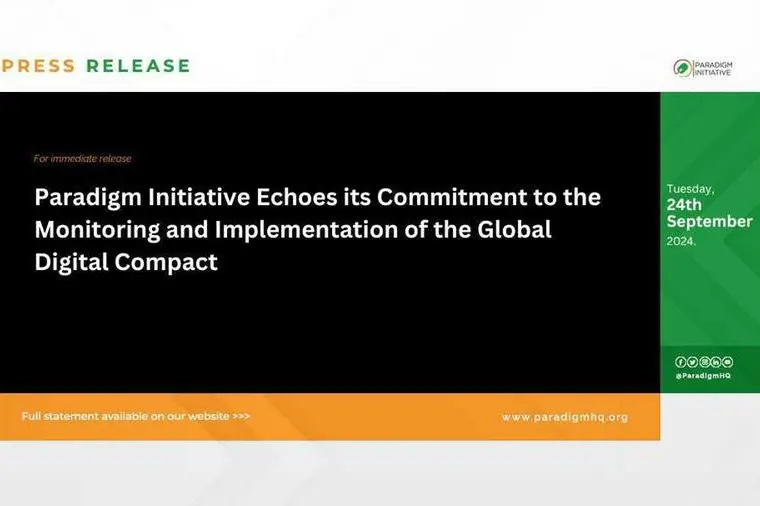PHOTO
Global efforts towards building a better digital future for all have gained momentum with the adoption of the Pact of the Future at the ongoing UN Summit for the Future, a move that has been welcomed by Paradigm Initiative (PIN), a leading pan-African non-governmental organisation.
Paradigm Initiative, while embracing the adoption of the Pact of the Future with the Annexed Global Digital Compact (GDC) says, the GDC demonstrates the importance of ensuring that technology is designed and used in a way that does not violate human rights, but takes advantage of the benefits to bridge the digital divides.
"We acknowledge the delicate process that has seen substantial provisions remaining following negotiations of the text and appreciate the GDC as a document that promotes bridging the digital divide and establishment of digital rights safeguards. The significance of this adoption for our work is its alignment with our vision embedded in our 2024-2028 Strategic Management Plan to foster a digitally inclusive and rights-respecting world,” Thobekile Matimbe, the organisation’s Senior Manager, Partnerships and Engagements stated. It goes on to affirm its position to monitor the GDC implementation and to ensure it unpacks its text to communities within the Global South in collaboration with government actors and international agencies that are willing to collaborate.
In response to the Interactive Dialogue on Enhancing Multilateralism for International Peace and Security at the UN Summit of the Future, Paradigm Initiative highlights the importance of a multistakeholder approach to fostering the rights-respecting development of technology that supports peace and security. Tackling information disorders such as hate speech and violent extremism, establishing consensus over key definitions of terms such as cybercrimes to foster a common understanding of what they are in the realm of peace and security is critical. We recommend the ongoing cyber treaty-making process to consider this. In addition, establishing accountability mechanisms within the United Nations to hold both States and Technology Companies accountable in line with international human rights law obligations for States and business and human rights responsibilities for the private sector is pertinent.
We recommend the development of articulated guidelines on how technology can be leveraged as an early warning tool to potentially avoid conflict and assess the human rights impacts arising from deploying technology to avoid human rights impacts. In the context of content moderation, developing policies, laws and community standards that navigate the delicate balance of safeguarding freedom of expression on one hand and promoting peace and security on the other is key, with clear guidelines that drive collective international cooperation towards a new peace agenda. To this end, we recommend the UN prioritising processes that ensure the voices of those in the Global South are heard and included in approaches to strengthening the “do no harm principle through UN platforms in the form of dialogues addressing peace through the use of technology.” On this course, it is important to ensure that those in the Global South have adequate resources to participate in these processes.
In addressing Interactive Dialogue 3, Towards a Common Digital Future: Strengthening inclusive innovation and cooperation to bridge the digital divides, PIN highlights that in line with the principles of inclusion, gender equality and safe, secure and trustworthy emerging technologies articulated in the GDC, it is important to urgently address the digital divide in the Global South. Our Londa 2023 report on digital rights presents that only 10 out of 26 African countries reported are transparent about the utilisation of Universal Service Funds (USF) to bridge the digital divide with the potential to promote digital inclusion of under-served communities. We recommend cooperation that bridges the digital divide through deliberate utilisation of the USF and prioritisation within national budgets towards improving digital public infrastructure.
The role of the private sector as a critical stakeholder is key in addressing digital divides that call for multi-stakeholder engagements at platforms such as the Digital Rights and Inclusion Forum DRIF which PIN hosts annually and will be held in Lusaka, Zambia from 29 April - 1 May 2025, and through public-private partnerships. In addition, the lived realities of women disproportionately affected by online gender-based violence and the onslaught on dissent targeting human rights defenders and the media through targeted mass communications surveillance online, particularly resulting in arbitrary arrests and malicious prosecutions in Africa, raises the pertinent need for a common global consensus towards the development of robust policies that create an environment that enables the safe use of online platforms and technology keeping human rights intact, safeguarding the rights of the most vulnerable. Failure of the policy and legislative architecture to provide human rights guardrails leads to digital insecurities of vulnerable groups.
Less than 10 African countries have developed national AI strategies, and with low agility in this regard, it is pertinent for the development of AI strategies that demonstrate State commitments towards human rights and meaningful engagement of civil society organisations towards a rights respecting, inclusive Digital Future. Within the Internet Governance Forum and other existing UN platforms, we recommend the expansion of AI and emerging technologies’ dialogues to constantly gather input from diverse stakeholders and build consensus.
Lastly, we call for Member States engagement with organisations like ourselves involved in digital literacy programmes across Africa through initiatives such as the LIFE Legacy Programme which we are implementing across Africa and has improved digital literacy for over 150,000 beneficiaries.
With these recommendations, Paradigm Initiative is available and accessible on partners@paradigmhq.org to discuss collaborations as the work unfolds beyond the adoption of the GDC.




















